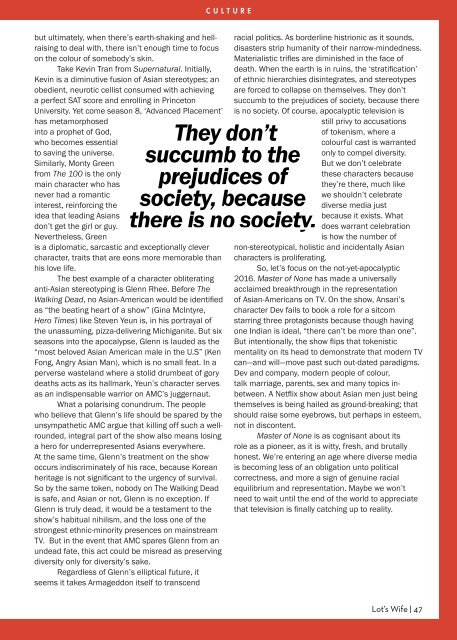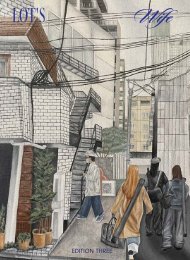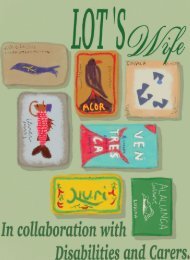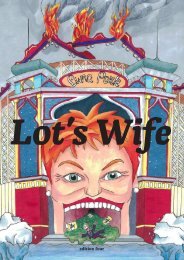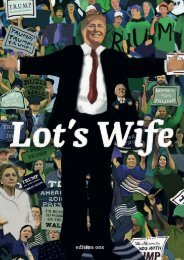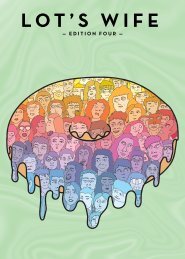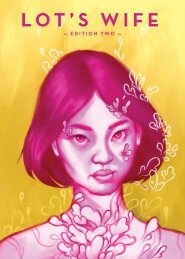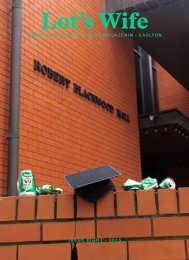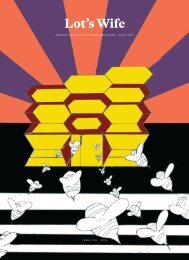Lot's Wife Edition 1 2016
You also want an ePaper? Increase the reach of your titles
YUMPU automatically turns print PDFs into web optimized ePapers that Google loves.
CULTURE<br />
but ultimately, when there’s earth-shaking and hellraising<br />
to deal with, there isn’t enough time to focus<br />
on the colour of somebody’s skin.<br />
Take Kevin Tran from Supernatural. Initially,<br />
Kevin is a diminutive fusion of Asian stereotypes; an<br />
obedient, neurotic cellist consumed with achieving<br />
a perfect SAT score and enrolling in Princeton<br />
University. Yet come season 8, ‘Advanced Placement’<br />
has metamorphosed<br />
They don’t<br />
succumb to the<br />
prejudices of<br />
society, because<br />
there is no society.<br />
into a prophet of God,<br />
who becomes essential<br />
to saving the universe.<br />
Similarly, Monty Green<br />
from The 100 is the only<br />
main character who has<br />
never had a romantic<br />
interest, reinforcing the<br />
idea that leading Asians<br />
don’t get the girl or guy.<br />
Nevertheless, Green<br />
is a diplomatic, sarcastic and exceptionally clever<br />
character, traits that are eons more memorable than<br />
his love life.<br />
The best example of a character obliterating<br />
anti-Asian stereotyping is Glenn Rhee. Before The<br />
Walking Dead, no Asian-American would be identified<br />
as “the beating heart of a show” (Gina McIntyre,<br />
Hero Times) like Steven Yeun is, in his portrayal of<br />
the unassuming, pizza-delivering Michiganite. But six<br />
seasons into the apocalypse, Glenn is lauded as the<br />
“most beloved Asian American male in the U.S” (Ken<br />
Fong, Angry Asian Man), which is no small feat. In a<br />
perverse wasteland where a stolid drumbeat of gory<br />
deaths acts as its hallmark, Yeun’s character serves<br />
as an indispensable warrior on AMC’s juggernaut.<br />
What a polarising conundrum. The people<br />
who believe that Glenn’s life should be spared by the<br />
unsympathetic AMC argue that killing off such a wellrounded,<br />
integral part of the show also means losing<br />
a hero for underrepresented Asians everywhere.<br />
At the same time, Glenn’s treatment on the show<br />
occurs indiscriminately of his race, because Korean<br />
heritage is not significant to the urgency of survival.<br />
So by the same token, nobody on The Walking Dead<br />
is safe, and Asian or not, Glenn is no exception. If<br />
Glenn is truly dead, it would be a testament to the<br />
show’s habitual nihilism, and the loss one of the<br />
strongest ethnic-minority presences on mainstream<br />
TV. But in the event that AMC spares Glenn from an<br />
undead fate, this act could be misread as preserving<br />
diversity only for diversity’s sake.<br />
Regardless of Glenn’s elliptical future, it<br />
seems it takes Armageddon itself to transcend<br />
racial politics. As borderline histrionic as it sounds,<br />
disasters strip humanity of their narrow-mindedness.<br />
Materialistic trifles are diminished in the face of<br />
death. When the earth is in ruins, the ‘stratification’<br />
of ethnic hierarchies disintegrates, and stereotypes<br />
are forced to collapse on themselves. They don’t<br />
succumb to the prejudices of society, because there<br />
is no society. Of course, apocalyptic television is<br />
still privy to accusations<br />
of tokenism, where a<br />
colourful cast is warranted<br />
only to compel diversity.<br />
But we don’t celebrate<br />
these characters because<br />
they’re there, much like<br />
we shouldn’t celebrate<br />
diverse media just<br />
because it exists. What<br />
does warrant celebration<br />
is how the number of<br />
non-stereotypical, holistic and incidentally Asian<br />
characters is proliferating.<br />
So, let’s focus on the not-yet-apocalyptic<br />
<strong>2016</strong>. Master of None has made a universally<br />
acclaimed breakthrough in the representation<br />
of Asian-Americans on TV. On the show, Ansari’s<br />
character Dev fails to book a role for a sitcom<br />
starring three protagonists because though having<br />
one Indian is ideal, “there can’t be more than one”.<br />
But intentionally, the show flips that tokenistic<br />
mentality on its head to demonstrate that modern TV<br />
can—and will—move past such out-dated paradigms.<br />
Dev and company, modern people of colour,<br />
talk marriage, parents, sex and many topics inbetween.<br />
A Netflix show about Asian men just being<br />
themselves is being hailed as ground-breaking; that<br />
should raise some eyebrows, but perhaps in esteem,<br />
not in discontent.<br />
Master of None is as cognisant about its<br />
role as a pioneer, as it is witty, fresh, and brutally<br />
honest. We’re entering an age where diverse media<br />
is becoming less of an obligation unto political<br />
correctness, and more a sign of genuine racial<br />
equilibrium and representation. Maybe we won’t<br />
need to wait until the end of the world to appreciate<br />
that television is finally catching up to reality.<br />
Lot’s <strong>Wife</strong> | 47


